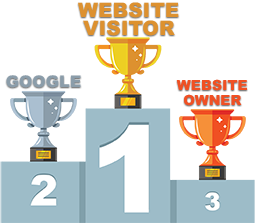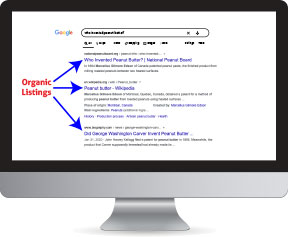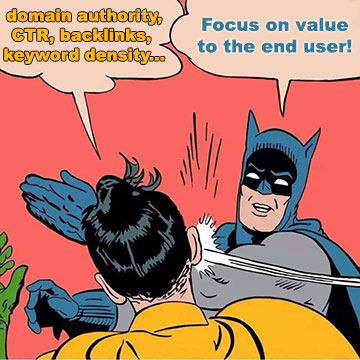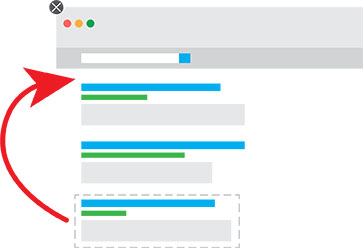WHY YOUR SEO SUCKS

Introduction:
From the time I picked up Shari Thurow’s first edition of Search Engine Visibility in 2003, I was hooked.

For whatever reason, I was enthralled with the material I was reading. SEO was still in its infancy, but nonetheless it was a fascinating subject and I just couldn’t stop thinking about it.
Eighteen years later, there have been a lot of changes in SEO.
Tricks and schemes that worked yesterday do not work today.
The search engines became wise to them and re-wrote their ranking algorithms to circumvent the shenanigans.
New tricks and schemes were subsequently launched by the SEOs and again they were curtailed by the search engines.
It’s been a cat and mouse game from the start.

However, slowly but surely, that cat and mouse game is coming to an end.
As more and more people adopt the philosophy contained in the following pages, SEO is approaching a renaissance movement.
The benefits of understanding and practicing this content:
If you are able to grasp the material contained in this content, you will come away with several benefits.
Why Your SEO Sucks will give you a new way of thinking that your competitors do not have.
When you understand why things currently work the way they do, you will be capable of putting together a much more effective plan for your SEO campaign.
Whether you are a seasoned, experienced SEO or a small business owner interested in learning about the very broad topic of SEO and how it can help you, I encourage you to read this post all the way to the end.
There is a message to my madness. The message may seem convoluted at first, but it will all come together in the end.
There is a logical aspect to this content, as well as a philosophical and spiritual aspect. A practical and a theoretical. A yin and a yang.

Judging by the title, you may be expecting a negative, expletive-filled bunch of pages ranting about why your SEO campaign is a complete failure.
Nothing could be further from the truth.
If you are able to embrace the philosophy contained within the following pages, you will be able to implement a practical solution.
Now that I have your attention, let’s dive in.
The Three Main Players:
If you want to really win the game of search engine optimization, you have to understand who’s playing.
When it comes to SEO, there are three primary players:
- Website owner
- Website visitor
Most current SEO strategies focus on rankings first and foremost, placing the vast majority of their focus on the website owner.
After all, rankings are the holy grail of any effective SEO campaign, aren’t they?
I want better rankings, so I will start an SEO campaign to get me what I want.
That’s the conventional thinking anyway.
How can I, the website owner, rank my pages to bring in more traffic and make more money for myself?
Some of the more educated SEO clients may want to use content marketing and white hat SEO techniques as a means of ranking their pages. Others may simply wish to have magical SEO dust sprinkled over their pages and have them rise to the top of the SERPs.
Either way, from the SEO client’s perspective, the model looks like this:

But here’s the problem…
As a website owner, putting your own needs ahead of your end users’ needs and the search engines’ needs is very short-sighted and will not yield the best results.
It might work in the short run, but definitely not in the long run.
There was a time when it did, but that time has passed.
Unfortunately, many SEOs remain stuck in the past, unable to change their mentality as it relates to SEO.
But here’s a thought…
What if you turned the previous model on its head and put the search engine and the end user’s needs above your own?
That model looks like this…

What do the search engines want?
Google, Bing, Duck Duck Go, and all major search engines want one thing.
They all want to make money.
Google has established itself as a household name through mass adoption by the public. Everyone knows who Google is and what they do. Their name is even a verb for goodness sake. But how did Google pull off such a feat?
Are you ready for it?
Google became a household name and one of the biggest corporations on earth by doing one thing very well – providing information solutions to its customers on a massive scale.

Google’s Mission Statement:
“Our company mission is to organize the world’s information and make it universally accessible and useful. That’s why Search makes it easy to discover a broad range of information from a wide variety of sources.”
Ok, great. We have established what Google wants – to make money.
Now the question becomes, how?
How does Google make money?
Google makes its money, indirectly, by providing the solutions their users seek.
More than anything, what Google wants is for you, when you come to Google and run a search, to walk away with a solution.

Google also wants you to find that solution in very short order. It wants you to be instantly gratified after you press the enter key.
Whether the solution you are looking for is the definition of a word, a recipe for banana bread, or a local chiropractor that can fix your back, Google’s ranking algorithm is designed to solve your problem, as quickly and expeditiously as possible.
Google knows that it gets what it wants not by focusing on itself, but instead focusing on the website visitor.
Google is About Providing solutions.
Remember, search engines, like all businesses, are out to make money. And Google, the 800-pound gorilla of search engines, is one of the most powerful and profitable business in the world.
Why? Because they have created a system that helps a whole lot of people.
The more people you are able to help, the more money you are going to make.
It sounds like an over-simplification, but I have put it under the microscope and it is indeed true.
I’m actually practicing this principle right now. It is the impetus underlying the writing of this blog content.
I want to help a whole bunch of people by explaining the why behind search engine optimization.
I know that if I can reach a large number of people with my message, they are going to be better off.
Yes, I want to make money. But I want the money to be a side effect of the comprehensive utility I am able to provide my fellow man.
So back to our thesis…
Google is about making money. But how does Google make money when you type in a search query?
The short answer, they don’t.
Google makes its money not when you type in the search query, but when you click on their sponsored results.
Every time someone clicks on a sponsored result, Google makes a little bit of money.

Google became a household name by giving away instant gratification to its users while simultaneously practicing delayed gratification for itself. And you can do the same!
Let me explain…
Google was brand new in 1998 and at that time there were no sponsored ads. No one knew who they were and if you uttered the word “Google” you would get nothing but a strange look in return.

Google gave their services away for over two years before they even launched their sponsored ads. They provided on-the-spot solutions (instant gratification) during this two-year period while asking for nothing in return (delayed gratification).
At the end of the day, we are all problem solvers. Each time you run a search query on Google, you are searching for a solution, and if you find the solution you are searching for, Google knows that you will continue to use it.
It’s basic human nature. If a certain tool provides solutions to your problems, and there is no charge to you for its use, you will continue to employ it. And Google knows this.
If you continue to come back and use Google on a regular basis as a means of solving problems, Google knows that you will, at some point, click on their sponsored results.

Free Ice Cream:
Think of it this way…
Google is an ice cream vendor giving away free samples. Google is providing you the ice cream, free of charge, via the organic search results.
Google knows that, if you are pleased with the ice cream, you will continue to come back for more. And if you continue to come back for more, you will eventually purchase ice cream from them via the sponsored search results.

Remember, Google does not make any money when you click on the organic results in the SERPs. The organic results are simply a means to an end, a cog in the wheel of Google, the free ice cream samples.
Each of the web pages Google displays in the organic results is simply a way of getting users to eventually click on the sponsored ads.
Google has made it worth the effort to rank in the organic results by allowing people to use and benefit from their infrastructure in exchange for providing the solutions the user is seeking and thus making Google into a hero in the eyes of the user.

In return for this allowance, Google is assured that the users will continue to use it as a source of solutions and eventually click on the sponsored ads in the SERPs.
So, thinking from the end, we can say:
- Google wants to make money.
- Google provides free solutions as a means of bringing people back
- When users come back, Google entices them to click the sponsored ads
- Every time a sponsored ad is clicked, Google makes a little bit of money
Ok, I think I understand. So…how does this help me?
Having a firm and fundamental understanding of this concept gives you, the web site owner, great power and opportunity.
You no longer have to obsess over the latest SEO schemes on how to obtain backlinks, write content with the proper keyword density, or find ways to increase your domain authority.

Your task, with this understanding, is simple but not easy.
You only have to do one thing…
Create the content that provides the best solution. Then, give it away. For free.
Giving Away Solutions:
Using the ice cream vendor metaphor, we can say that the best way to make money is to give away your knowledge and expertise for free.
This is where I lose a lot of people. Fear sets in and people say to themselves, “But…if I give away the solutions my business provides for free, no one will ever buy from me and I won’t make any money.”

I understand this mentality. I unconsciously embraced it myself for quite some time, but in reality nothing could be further from the truth.
The bottom line is this…
There is enough for everyone. Digital marketers who do not embrace this philosophy and instead continue to put their own needs in front of their clients and end users are going to die.
They are dying as we speak.
In order to thrive in today’s world, you have to practice give-to-get.
Give to Get
Remember, it is in giving that we receive.
Keep this in the forefront of your mind as you put together your SEO campaign.

Ask yourself, what is something of value that can I give away for free to a whole bunch of people? The more the better. This is where the essence of prosperity lies.
It seems counter-intuitive, but believe me it is not.
By focusing on giving you will, after a lag period, begin to receive.
Now back to the logical…
It is through creating valuable solutions and giving them away for free that you will begin to prosper. Ok, great. Now the question becomes, how do you figure out what the best solution is for any given keyword query?
It’s not difficult, just go to Google.

I recently ran a Google search for “Fort Myers apartments.” The entire first page of results were pages with maps on one side of the page and a list of apartments on the other side with pictures, descriptions, and contact information. The entire first page.
What does this tell us?
Very simple. This is the solution users are seeking. People who search for “Fort Myers apartments” are at the consideration stage of the sales funnel.
Are they looking for lists of characteristics in a good Fort Myers apartment? Or a blog post on things to watch out for when renting an apartment in Fort Myers?
No.
How do we know? Simply look at the SERPs.
This leads us to…
Finding What the User Wants
Google, through its ever-changing ranking system, has found a way to determine searcher intent algorithmically.

Once upon a time there were several informational blog posts listed on the first page for the keyword phrase “Fort Myers apartments.”
But slowly, over time, by monitoring the behavior of the user after they landed on those pages, Google quickly deduced that, by and large, users were not finding the solutions they were seeking on those pages.
Those users, after landing on the informational pages, were quickly leaving, going back to the SERPs and clicking on another results page.
When they found the results they were looking for, in this case maps and addresses with contact information, they stayed and spent time there, telling Google “this is the solution I am seeking.”
Google then moved those pages higher in the organic rankings as a means of providing more people with the solutions they are seeking.
 Through a process of elimination, all of the informational pages were crowded out and the entire first page of the SERPs is now composed of maps, locations, and pictures.
Through a process of elimination, all of the informational pages were crowded out and the entire first page of the SERPs is now composed of maps, locations, and pictures.
The bottom line…
Through the monitoring of user experience metrics (time on page, time on site, bounce rate, average page views per session), Google has effectively created a means of quantifying quality.
Does your website need to be updated? Read my blog post on quality website design.
The pages that provide the average user with the solution they are seeking will always win in the end.
Google knows that it gets what it wants by giving the users what they want.
GGWIW
And now you know that you get what you want by giving Google what it wants. I refer to this as GGWIW or Giving Google What It Wants.
Google loves long-form, detailed, thorough content written by experts and including a variety of media types.
Why does Google love this type of content? It’s what their users are searching for, and Google loves providing its users the content they are searching for.
The days of publishing 200-500 word blog posts once a week are over.
Do you want to succeed at your next SEO campaign?
Think from the end and find a way to implement GGWIW.
What about black hat SEO?
Black hat SEO is a means of artificially manipulating Google’s page ranking criteria to achieve an outcome that the web site owner will benefit from.
In essence it is a means of tricking Google into believing that your page provides the best solution, when in fact it does not.

Black hat SEO is getting more and more difficult to pull off as we move forward. It is in diametrical opposition to the Give to Get model we spoke about earlier.
It is not good for the user, it is not good for Google, and it is not good for the client.
Black hat SEO is a lose-lose-lose proposition.
Why does Google forbid black hat SEO?
Google condemns black hat SEO practices because it handicaps their primary chief aim: providing the user with the solutions they are seeking.
If I go to Google and type in “Fort Myers apartments,” and Google displays a list of apartments in Chicago, I am going to be annoyed.
At best I am going to have to go back to the SERPs and click on another result and at worst I am not going to be able to find the information I want at all.
If I cannot trust Google as a tool for providing solutions, am I going to continue using Google?
Probably not.
And if I do not continue to use Google as a means of solving problems, am I going to eventually click on the sponsored ads in the SERPs?
Definitely not.
And if I do not click on the sponsored ads, is Google going to make money?
No way!
The Law of Reciprocity:
By George I think I’ve got it!
Now, how do I start using this information to my advantage?
Use the Law of Reciprocity.
Simply stated, the law or reciprocity says that if someone does something nice for you, you in turn are naturally inclined to do something nice for them.

Again, it plays off our most basic human nature.
If your web site is relatively new with little or no traffic, you can start by creating content that benefits the end user.
Put that in the forefront of your mind before you even begin to create the content.
What do my users need and want?
Once you have that information, one third your work is finished. Now you just need to create the content and disseminate it.
The content you create can be in the form of landing pages, blog posts, or assets such as a downloadable pdf checklist or an embeddable info-graphic.
If you’re not sure, ask your users for feedback. What do they want and need? Modify, adapt, and reinvent.
In exchange for the value you give your end users, you will then ask them for something in return using the law of reciprocity.
This can come in the form of an email address to send the asset to, a comment on a web page, a referral, or a review/testimonial after they have had a chance to use the asset.
You also want to create content that benefits Google.
If you find a keyword phrase that has relatively high volume and low competition, Google actually wants you to create good content on that subject.
Why? Google will benefit from it if you do. After all, users are searching for that content and there’s not much for Google to show them.
In return for creating the new content, Google will reward you by ranking your page high in the SERPs.

This strategy is going to grow your following to the point that you have more customers, bringing in more revenue for your business, which can then be re-invested.
If you put Google’s needs and your users’ needs in front of your own, you will produce unbelievable results.
Summary:
Why does your SEO suck?
Because you have been focusing on the wrong audience, namely yourself.
Want to un-suck your SEO?
You can do it! But not with the same mindset that created the sucky SEO.
Wipe the slate clean and start over by discovering and creating content that benefits Google and your ideal clients.

This new methodology will connect you, much more efficiently, with the people who are in the market to consume your products and services.
Ironically, focusing on the needs of others is what will create the greatest benefit to yourself.
Conclusion:
Our world is changing in unimaginable ways at this point in time. It is up to each of us to be the change in the world that we want to see. And it all starts on a mental level.
Focus on giving users and the search engines what they want. Create assets with great value and disseminate them far and wide.
You will succeed by creating valuable content that matches the user intent of the search query.
You will also succeed by creating content that benefits Google and the search engines.
Give those solutions away and the value will come back to you exponentially.

Scott Allen is the author of this blog post. Please think of me when you are in need of Fort Myers digital marketing services.